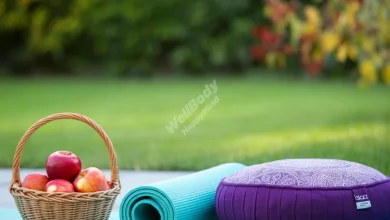The Body’s Intuition: Listening and Healing through Holistic Wellness

In a world filled with noise and distractions, it can be easy to lose touch with our body’s innate wisdom. Listening to our body and honoring its signals is a powerful practice that can lead to profound healing and overall well-being. Holistic wellness encompasses the idea that our physical, mental, and emotional health are interconnected, and by nurturing all aspects of ourselves, we can achieve a state of balance and harmony.
Section 1: The Power of Intuition
Our bodies have an incredible ability to communicate with us, often through subtle signals that we may overlook in our busy lives. Tuning into this intuition can help us make better decisions, improve our health, and enhance our overall quality of life. When we ignore these messages, we may experience physical symptoms, emotional distress, or a general sense of unease.
Section 2: Mind-Body Connection
The mind-body connection is a fundamental aspect of holistic wellness, emphasizing the impact of our thoughts and emotions on our physical health. Research has shown that practices such as meditation, yoga, and mindfulness can help reduce stress, lower blood pressure, and boost the immune system. By fostering a positive mindset and addressing emotional imbalances, we can support our body’s natural healing mechanisms.
Section 3: Holistic Approaches to Healing
Holistic wellness incorporates a variety of approaches to healing, taking into account the whole person rather than just isolated symptoms. These may include nutrition, exercise, herbal medicine, energy healing, and bodywork therapies. By addressing the root causes of illness and promoting self-care practices, holistic modalities aim to restore balance and vitality to the body.
| Holistic Approach | Description |
|---|---|
| Nutrition | Focuses on nourishing the body with whole foods |
| Energy Healing | Aims to balance the body’s energy systems |
| Herbal Medicine | Uses plant-based remedies for healing |
Section 4: Benefits of Listening to Your Body
When we listen to our body’s intuition and respond to its needs, we can experience a range of benefits, including:
- Increased energy and vitality
- Improved immune function
- Enhanced emotional well-being
- Better stress management
Section 5: Practices for Cultivating Body Awareness
Cultivating body awareness is essential for tuning into your body’s signals and fostering a deeper connection with yourself. Here are some practices to help you enhance your body awareness:
- Mindful breathing exercises
- Body scan meditation
- Yoga or tai chi
- Journaling your thoughts and feelings
Section 6: The Role of Nutrition in Holistic Wellness
Nutrition plays a crucial role in holistic wellness, providing the building blocks for cellular function and overall health. A diet rich in whole, nutrient-dense foods can support optimal well-being and help prevent illness. By listening to your body’s cues and fueling it with nourishing foods, you can promote vitality and longevity.
Section 7: Embracing Self-Care Practices
Self-care is a vital component of holistic wellness, allowing us to nurture ourselves on a physical, emotional, and spiritual level. Prioritizing self-care activities such as massage, aromatherapy, nature walks, and creative expression can help us recharge and rejuvenate. By making self-care a priority, we can enhance our overall quality of life and well-being.
Section 8: The Importance of Emotional Healing
Emotional healing is an essential aspect of holistic wellness, as unresolved emotional issues can manifest as physical symptoms in the body. Practices such as therapy, journaling, meditation, and expressive arts can help us process and release emotional wounds, leading to greater inner peace and balance. By addressing our emotional well-being, we can support our body’s innate healing abilities.
Section 9: Finding Balance in a Hectic World
In today’s fast-paced world, finding balance and harmony can be a challenge. Incorporating mindfulness practices, setting boundaries, and prioritizing self-care are key strategies for navigating the demands of daily life while honoring your body’s needs. By creating space for rest, relaxation, and rejuvenation, you can cultivate a sense of equilibrium and well-being.
Section 10: Trusting Your Body’s Wisdom
Ultimately, the key to holistic wellness is trusting in your body’s innate wisdom and listening to its guidance. By honoring the messages it sends you, you can embark on a journey of self-discovery, healing, and transformation. Embrace the power of your body’s intuition and embark on a path of holistic wellness that nurtures your mind, body, and spirit.
FAQ
Q: What is holistic wellness?
A: Holistic wellness is an approach to health that considers the whole person, focusing on physical, mental, emotional, and spiritual well-being.
Q: How can I cultivate body awareness?
A: Practices such as mindfulness, meditation, yoga, and journaling can help you cultivate body awareness and tune into your body’s signals.
Q: Why is emotional healing important in holistic wellness?
A: Emotional healing is crucial in holistic wellness as unresolved emotional issues can impact physical health and overall well-being.
Key Takeaways
- Listening to your body’s intuition is key to achieving holistic wellness.
- The mind-body connection plays a significant role in overall health.
- Holistic approaches to healing consider the whole person, addressing root causes of illness.
- Nutrition, self-care practices, and emotional healing are essential components of holistic wellness.
- Trusting your body’s wisdom and embracing self-care are vital for maintaining balance and harmony in a hectic world.



